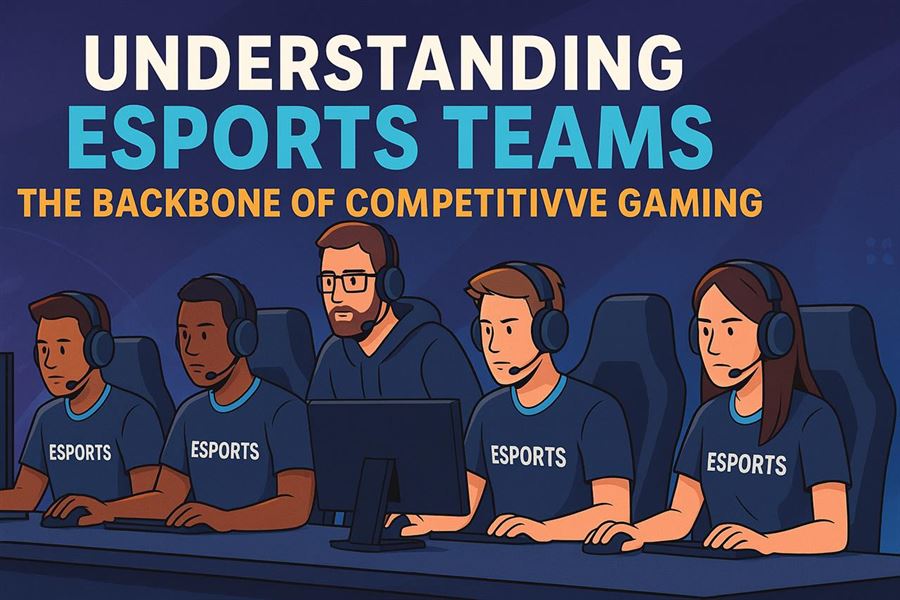Understanding esports teams - the backbone of competitive gaming

Esports, or electronic sports, have grown tremendously in recent years, evolving from niche gaming competitions into a billion-dollar global industry. At the core of this revolution are esports teams, highly organized and competitive groups of professional gamers who compete in tournaments for fame, sponsorships, and lucrative prize pools.
The Structure of Esports Teams
Like traditional sports organizations, esports teams are built with defined roles, training methods, and strategies. Teams typically specialize in a specific game or a set of games such as "League of Legends," "Counter-Strike: Global Offensive," "Dota 2," or "Valorant."
Team Composition
The composition of an esports team varies depending on the game. For example, a "League of Legends" team generally includes five starting players along with substitutes, while "CS:GO" squads consist of five active players. Players have defined roles, such as in-game leaders, attackers, supports, and snipers, tailored to specific game mechanics and strategies.
Support Staff
Beyond the players, successful esports teams have a variety of support roles. These include coaches, analysts, team managers, and even psychologists. Coaches help devise strategies and review gameplay footage, while analysts use data-driven insights to fine-tune team performance. Psychologists focus on mental health and helping players manage the stress and pressure of competitive play.
Popular Global Esports Teams
Several organizations stand out in the esports scene due to their historic achievements and strong fanbases.
- Team Liquid: Known for their success in games like "Dota 2," "StarCraft II," and "CS:GO."
- Fnatic: A U.K.-based team with a rich history in multiple titles including "League of Legends" and "Valorant."
- Na'Vi (Natus Vincere): Famous for their iconic player rosters in "CS:GO" and "Dota 2."
- T1: A South Korean powerhouse featuring championship-winning players in "League of Legends."
Pathways to Becoming a Professional Esports Player
The journey to joining an elite esports team is highly competitive. Aspiring players usually start by participating in amateur tournaments or online seasonal ladders. Strong performances can lead to being noticed by talent scouts and eventually joining smaller professional or academy teams.
Amateur and Semi-Pro Leagues
These leagues serve as proving grounds for emerging talent. They offer valuable experience and the opportunity to network within the esports community. Many professional players get their start here before moving up the ranks.
Scouting and Recruitment
Top esports teams often have dedicated scouting departments that monitor in-game statistics, analyze potential recruits, and conduct tryouts. Some teams also host open tournaments to discover new talent.
Sponsorships and Revenue
Esports teams generate revenue through a combination of tournament winnings, sponsorship deals, merchandise sales, and streaming content. Major brands like Red Bull, Nike, and Logitech sponsor esports teams, reflecting the growing mainstream acceptance of competitive gaming.
Merchandising and Brand Expansion
Teams invest heavily in branding, marketing, and merchandising to engage with fans. Jerseys, exclusive apparel, and digital content help build community and create revenue streams outside of tournaments.
The Future of Esports Teams
As esports continue to grow, teams are becoming more professional, adopting best practices from traditional sports. With investments from media companies, celebrities, and venture capital firms, the infrastructure supporting esports is evolving rapidly.
Predictive analytics, virtual reality training programs, and global talent development pipelines are just a few of the advancements shaping the next generation of esports teams. In the years to come, these teams are expected to not only compete but also influence pop culture, media, and technology.
Conclusion
Esports teams are more than just groups of gamers. They are sophisticated organizations that play a vital role in the continued success of the esports industry. As competitions become more intense and the industry matures, the role of esports teams will only become more pivotal on the global stage.